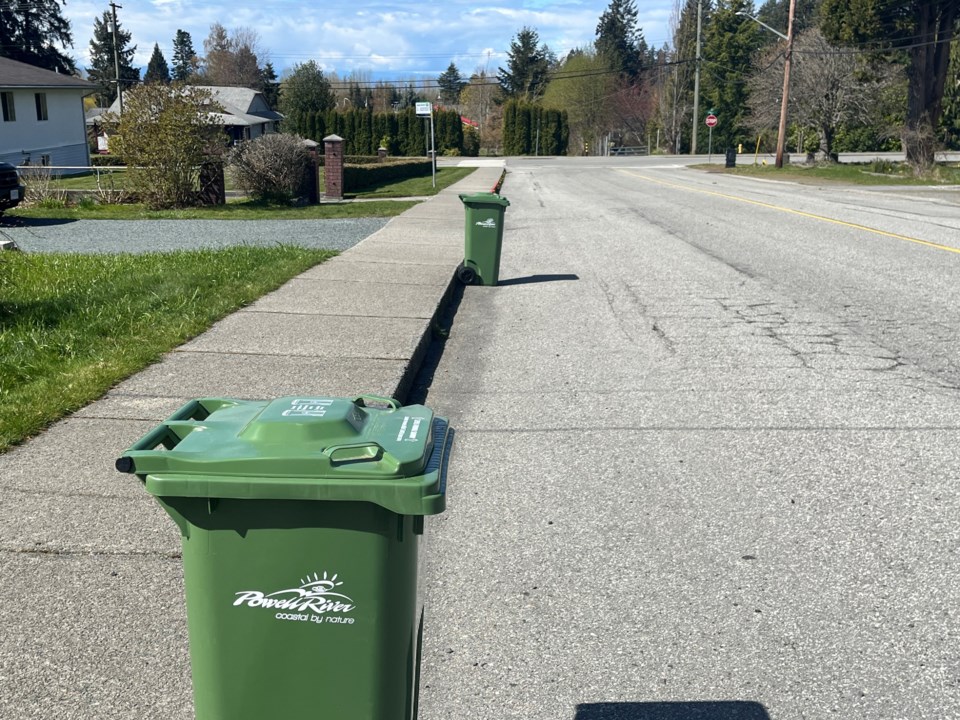Diverting food and biodegradable waste from the landfill is one way to decrease greenhouse gas emissions. But, for many municipalities in BC that have rolled out curbside compost pickup, it makes sense in other ways, such as reducing household food waste.
Compost pickup roll-out
City of Powell River launched a compost pilot program in 2017, and city council voted in favour of a residential curbside organics collection program for all houses, which started in March of 2024. Beginning in February, residents received 120-litre bins for food and yard waste to be picked up every week. Garbage collection is now every second week.
So far, the compost bin rollout increased the 400-plus households during the pilot program to more than 5,000, and has gone reasonably well, with only minor grumblings about the bins being smaller and the potential for compost to be a bear attractant. Some people already freeze their compostables, and keeping the bin dry and clean will keep bears away.
Food waste contributes to harmful emissions
According to the Compost Council of Canada, biodegradable material such as food waste constitutes approximately 40 per cent of the residential waste stream in Canada: "The environmental benefits of diverting organic materials from landfill include reduced methane emissions, and decreased leachate (contaminated liquid) quantities from landfills.”
Powell River mayor Ron Woznow agrees, and stated in a media release last year that, “by separating organic waste so it is composted rather than put in a landfill, [residents] will reduce the amount of greenhouse gas emissions associated with their waste.”
Diverting organics decreases garbage and animal attractants
According to Love Food Hate Waste, British Columbians throw away one out of every four bags of groceries; this adds up to almost 2.2 million tonnes of edible food wasted each year, for Canada as a whole.
In the qathet region, many folks already make their own compost and use it for gardening, and with the cost of food going up, people are more likely not to waste food. However, there are many food scraps that shouldn't be composted at home, such as meat, bones, shells, dairy and oils.
For those who do need to dispose of their biodegradable waste, having curbside pick every week is not only convenient but will also deter animal interaction, leave more room in the freezer, plus divert it from the landfill. City councillor Trina Isakson said at a meeting in December that, [residents she had spoken with], "love recycling and many people want to reduce their garbage further and therefore reduce our greenhouse gas emissions by processing organics and making it into compost rather than shipping it all the way to Washington State."
Organic waste can be used
Establishing the program also allowed the city to retain a $200,000 grant, and the city is eligible to receive $213,218 in a grant to reimburse the cost of the organics carts.
The Province of BC sees composting as a benefit for the environment and an opportunity to create a high-value and environmentally-responsible product: "Disposing of food and organic waste in landfills not only wastes valuable nutrients and takes up precious landfill space but also creates methane, a powerful greenhouse gas."
Organic waste diversion initiatives such as the one in qathet will, "process and beneficially use organic waste, returning the nutrients back to the soil and when handled properly, organic waste can become a valuable resource for communities, such as nutrient-rich compost," according to the province.
Waste Wise app is a convenient way to keep track
The qathet Waste Wise app is a handy tool to find out what can and cannot be composted, but most fruit and vegetable scraps can be, plus meat and bones, and coffee grounds. Flowers and yard waste can also go in the compost bin but not invasive species (blackberry, knotweed, ivy, broom), biodegradable plastic products, pet waste or biohazard waste.
Suitable bags or newspaper can be used
The city included samples of Only Bag to Earth collection bags with the compostable bins. They are compostable and leak resistant, with a 100 per cent paper cellulose liner. They can be found at Walmart and RONA in town. However, making a bag from newspaper is also suitable.
Tips on how to reduce food waste
To find out more about the City of Powell River organics collection program, go to powellriver.ca/pages/organics-compost-collection. To find tips about reducing food waste, check out lovefoodhatewaste.ca or watch a TED talk titled: How to feng shui your fridge–and other happy climate hacks, by UBC behavioural scientist Dr. Jiaying Zhao.
Join the Peak’s email list for the top headlines right in your inbox Monday to Friday.




